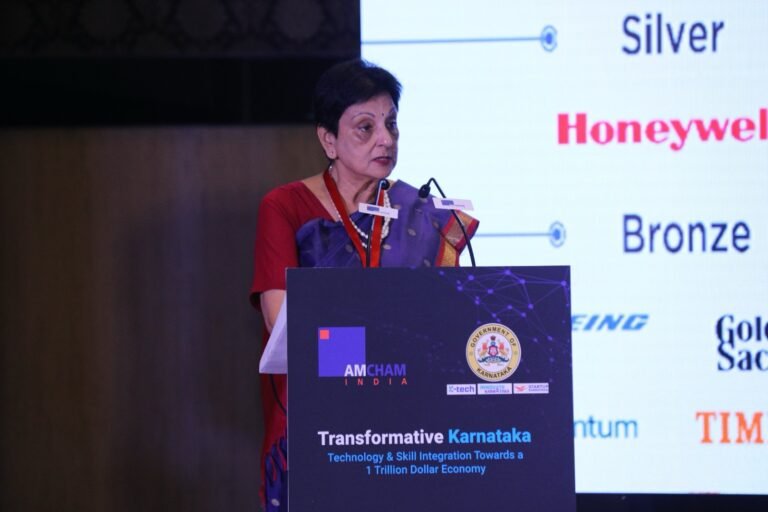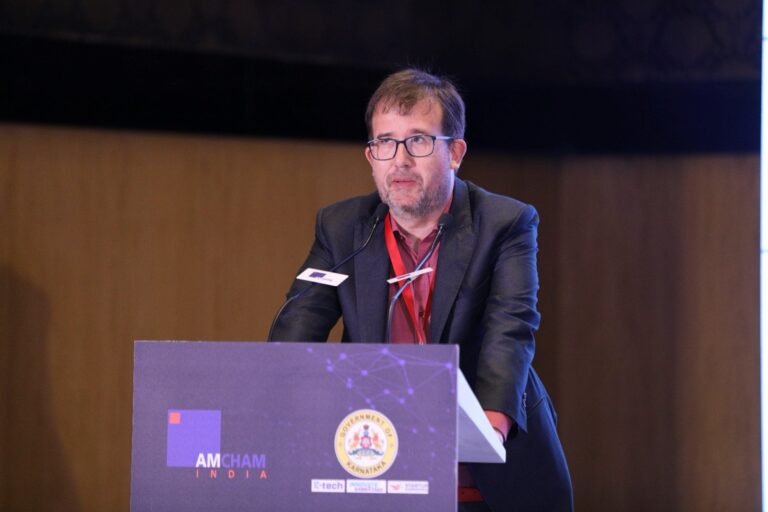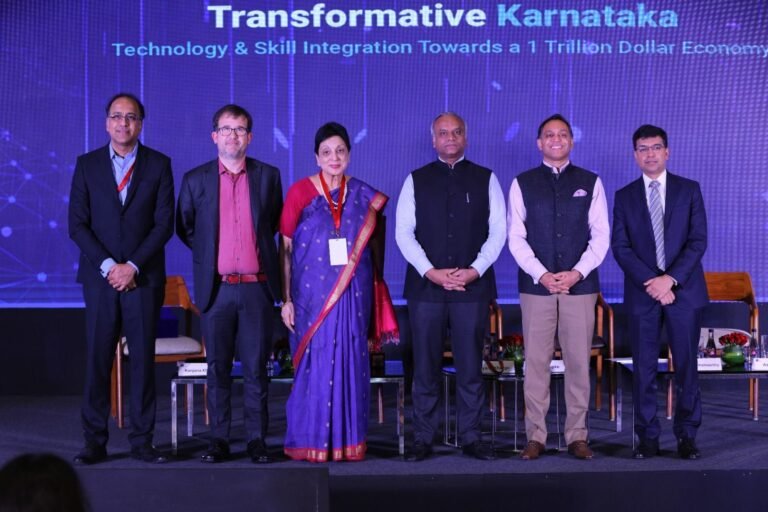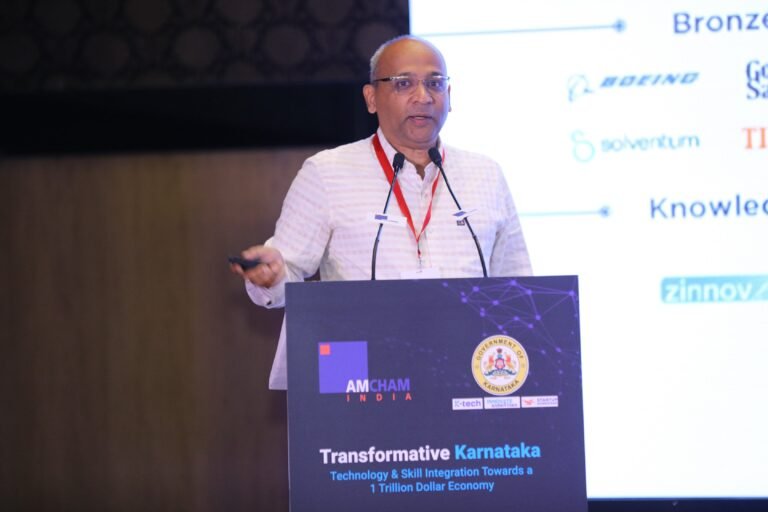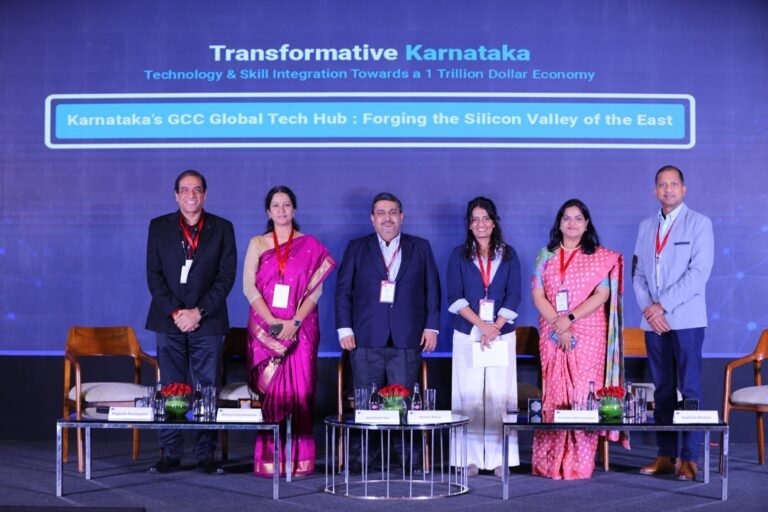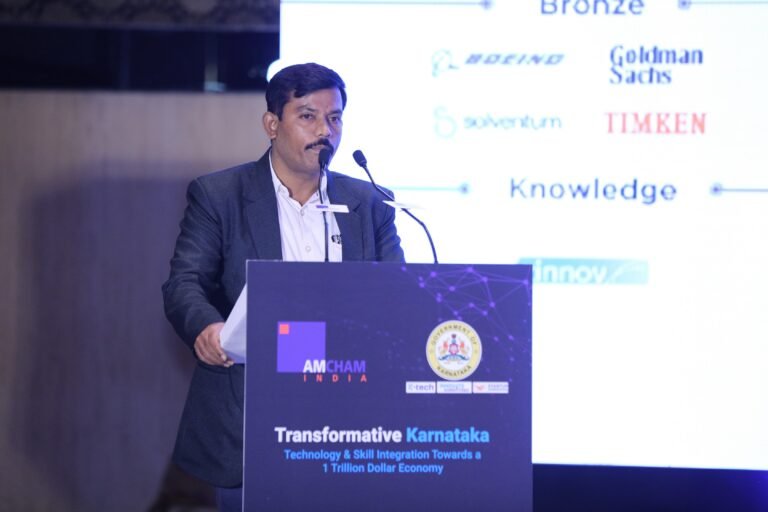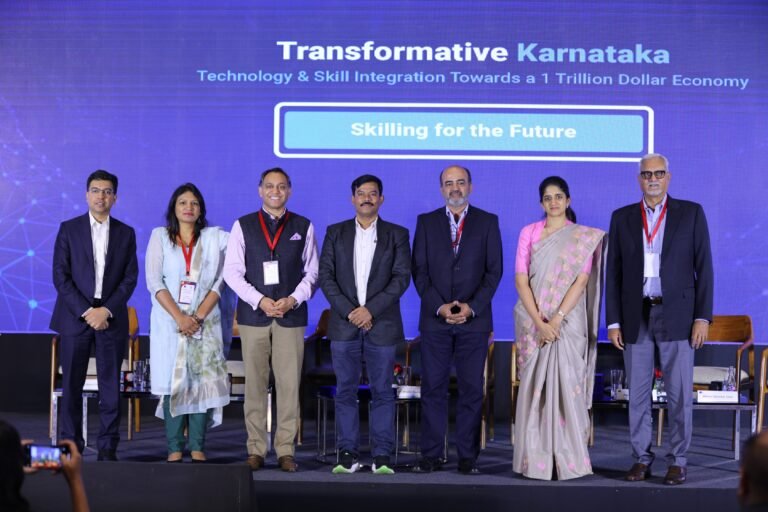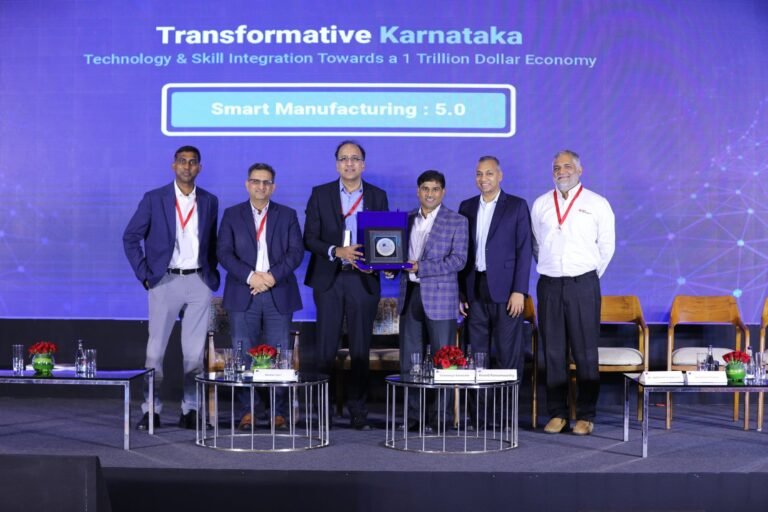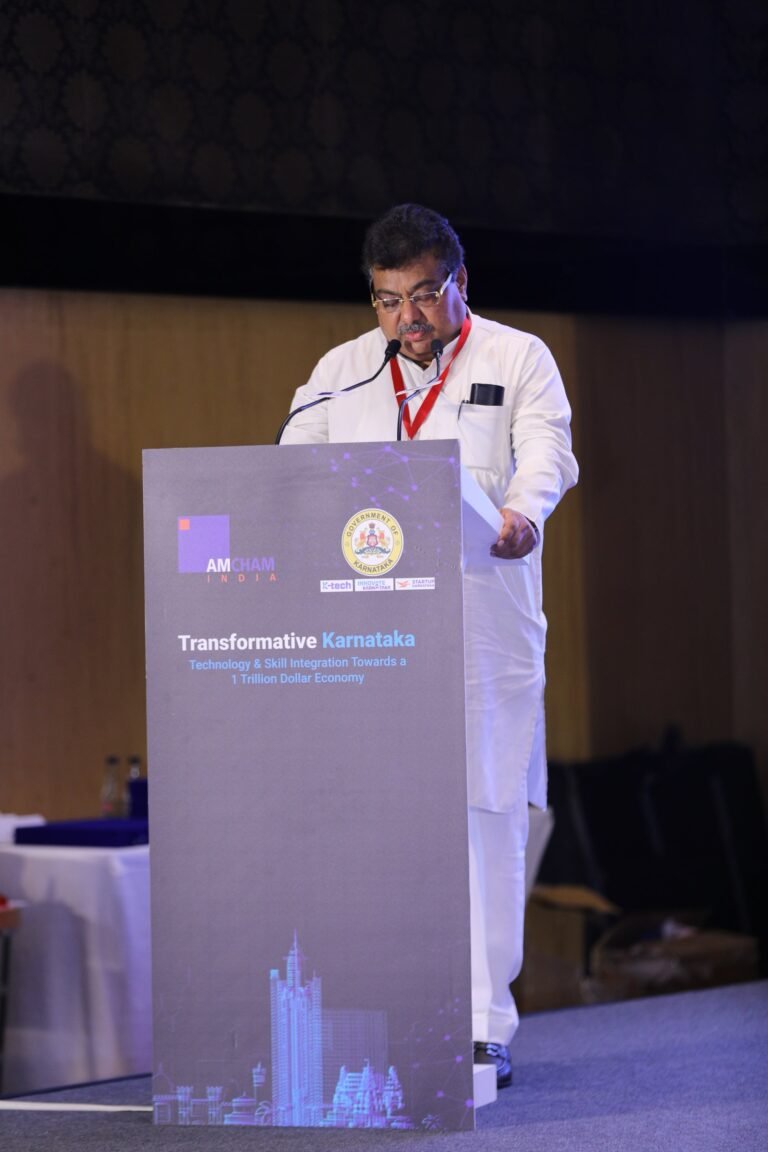Events
Past Events
Transformative Karnataka: Technology & Skill Integration Towards a 1 Trillion Dollar Economy
The signature event of AMCHAM’s Karnataka Chapter ‘Transformative Karnataka: Technology & Skill Integration Towards a 1 Trillion Dollar Economy’ was held on October 23rd at the JW Marriott, Bengaluru. In the inaugural session, Ms. Ranjana Khanna, Director General CEO, AMCHAM, emphasized Karnataka’s position as the ‘Silicon Valley of the East’ and shared her vision for Karnataka to achieve a $1 trillion economy, highlighting its unparalleled concentration of global capability centers (GCCs). Her remarks illustrated Karnataka’s journey as a thriving hub of growth and innovation, both nationally and globally. Mr. Salil Gupte, Chairman, AMCHAM and President, Boeing India & South Asia praised the productivity and skill of Bengaluru’s workforce, likening it to California as a global benchmark. He stressed that Karnataka is not only a talent epicenter but also focused on bridging the gap between academia and industry through targeted skill development initiatives. According to Mr. Gupte, the workforce in Karnataka is setting the standard for a new generation of globally competitive talent. Mr. Anand Ramamoorthy, Chairman -Karnataka Chapter, AMCHAM and Managing Director of Micron Technology Operations India LLC, set the scene for the conference and shared how Bengaluru is a hub of innovation and collaboration. He emphasized AMCHAM’s pivotal role in connecting American companies with India’s market while fostering partnerships and investment opportunities. He stressed the urgency of leveraging AI and deep tech for workforce upskilling, promoting smart manufacturing, and ensuring sustainable growth. In his special address Mr. Chris Hodges, Consul General, U.S. Consulate General Chennai, highlighted the strength of the U.S.-India relationship in Karnataka, noting the presence of over 630 U.S. companies in Bengaluru. He emphasized the need for aligning industry with academic institutions, advocating for joint research and development efforts.
Mr. Priyank Kharge, Hon’ble Minister for Rural Development, Panchayat Raj, Information Technology & Biotechnology, Government of Karnataka, in the keynote address discussed Karnataka’s progress as a result of years of dedicated development, citing over 250 engineering colleges, 70 medical institutions, and more than 1,000 ITIs. He noted that Karnataka contributes 25% of India’s tech workforce and achieved exports worth ₹4.5 lakh crore in 2023-24. He highlighted Bengaluru’s ranking as the 5th largest hub for AI and unicorn start-ups globally and announced the Nipuna Karnataka project, a ₹300 crore investment aimed at connecting academia with industry. Mr. Ashish Modi, Co-Chairman, Karnataka Chapter, AMCHAM and President, Honeywell India concluded the session by thanking all dignitaries for their insights and contributions. He emphasized Bengaluru and Karnataka’s remarkable growth story and acknowledged the ongoing collaboration and innovation that define the region’s success.
Track I: Karnataka’s GCC Global Tech Hub: Forging the Silicon Valley of the East began with a keynote address on Karnataka’s GCC Policy by Dr. Ekroop Caur, IAS, Secretary, Department of Electronics, IT, Biotechnology, and Science & Technology, Government of Karnataka. Dr. Caur gave a comprehensive presentation on the draft Karnataka GCC Policy (2024-2029) which covered the exponential growth of GCCs in India, especially in Karnataka, and factors fuelling the growth of GCCs in the state. She spoke about Bengaluru being the GCC capital of the world, innovation maturity of GCCs in Bengaluru, the favorable and conducive ecosystem and availability of talent as the biggest differentiator. While speaking about the draft GCC Policy, which is the first policy in the country dedicated to GCCs, Dr. Caur shared its objectives, marquee announcements and incentives. The comprehensive policy framework is designed to enhance the state’s appeal to multinational corporations by focusing on 4 key areas of talent, local ecosystem, infrastructure and incentives, and regulatory easing. AMCHAM, in collaboration with Zinnov, released ‘Karnataka Impact Report: A Deep Dive into U.S. Headquartered GCCs in the State.’ Ms. Namita Advani, Partner & Head, GCC (India), Zinnov shared key highlights of the report which takes a deep dive into the exponential rise of U.S. GCCs in Karnataka through six main levers of growth – maturity of incumbers, next gen technologies, global roles, innovation, regulatory policies, and support and DEI/ESG impact.
This was followed by an address on ‘AI: Enhancing the GCC Tech Scape’ by Mr. Ramesh Krishnan, Senior Vice President, Mphasis who shared about the role AI can play in financial planning and inclusion – for credit scoring and lending, personalized financial advice, fraud detection and risk management. He talked about how AI has the capability to provide faster, scalable and more trustworthy finance management experience and the design principles to take into consideration. On the flip side, he talked about the challenges and ethical considerations while using AI that includes – data privacy and security, biases and fairness in AI algorithms and regulatory/policy framework. He concluded by stating points to be considered for implementing AI for financial inclusion in India such as – identifying the target population, developing accessible AI solutions and partnerships with financial institutions and fintechs.
Panel I: GCCs Leveraging AI: Innovation & Digital Transformation in Karnataka was moderated by Ms. Deepa Nagraj, Senior Vice President & Global Head – ESG, Sparkle Innovation Ecosystem and Communications, Mphasis with Mr. Sumit Gupta, Co-Chairman – GCC Committee, AMCHAM and VP, Digital Technology, Cargill, Mr. Srinivas Prasad, Senior Director & India Site Head, Analog Devices, Mr. Rajat Puri, President, Carelon Global Solutions and Ms. Manjula Ramaswamy, Vice President and Partner – Global Capability Centers (GCCs), Kyndryl. Speakers talked about their respective GCC journeys, digital technology infrastructure, tech evolution, conducive ecosystem, transformation of GCCs from cost arbitrage centers to transformation hubs, strategies for evolution from staff augmentation to technology-led autonomous service models and ‘Make in India.’
Panel II: Capability Centers to Strategic Hubs: Reimagining Value Creation was moderated by Ms. Namita Adavi, Partner & Head, GCCs (India), Zinnov with Mr. Sathish Mohan, Vice President – Development, Finxact India Center, Global Services, Fiserv, Mr. Santhosh Rao, Partner & Executive Director, Business Unit Leader, Global Capability Centres, India, IBM Consulting, Ms. Nithya Subramanian, Head of Data & Analytics, AMEA, Kellanova (Kellogg’s), Mr. Rajesh Puneyani, VP Technology and GCC Site Leader, Kenvue and Ms. Praveena Bhimavarapu, SVP, Country Head – Global Capability Center India, Maximus. Speakers discussed the evolution of GCCs, difference between the newer GCCs and earlier versions, India as a source of value addition to the parent organization, driving value and growth, talent as the biggest driver for the growth of the ecosystem, talent readiness, challenges on the ground and key metrics to measure value.
Track II: Skilling for the Future began with a special address by Dr. Dinesh Kumar Y.K., IFS, Managing Director, Government Tool Room and Training Centre, Government of Karnataka. In his presentation, Dr. Kumar outlined the work being carried out by the skill ministry and the advent of future skills. He also talked about the government’s skill advisory committee and invited industry for greater partnerships. He spoke about the skilling ecosystem in Karnataka and enumerated the achievements of GTTC.
Empowering Karnataka’s Tech Future was panel with Ms. Parnika Pavanram, General Manager (Biotechnology & ESDM), Karnataka Innovation and Technology Society, Government of Karnataka, Mr. Ashish Modi, Co-Chairman – Karnataka Chapter, AMCHAM and President, Honeywell India, Mr. Ajay Vij, National Executive Board Member, AMCHAM and Country Managing Director, Accenture in India, Mr. Mosur Saisekar (Sai), Chief Country Executive – India, Carelon Global Solutions and Ms. Jhansi Potham, Director of Talent Acquisition, Micron Technology, India. Mr. Salil Gupte, Chairman, AMCHAM and President, Boeing India & South Asia moderated the session. Speakers deliberated upon the role of technology as an enabler of accelerating skilling at scale to help India’s vision of becoming a $1 trillion digital economy, ecosystem partnerships with academia and government, skilling in the industrial and manufacturing segment, role of sustainability, ways of building a future ready workforce and cultivating workforce capabilities and resilience to prepare for future challenges and opportunities and building a robust talent pipeline to foster early career engagements.
Track III: Smart Manufacturing 5.0 began with a keynote address by Dr. M.B. Patil, Hon’ble Minister for Large & Medium Industries & Infrastructure Development, Government of Karnataka who discussed Karnataka’s pivotal role in the U.S.-India partnership, focusing on collaboration in advanced manufacturing, aerospace, clean energy and healthcare R&D. He announced an upcoming economic roadmap set to unveil within a month, aimed at making Karnataka a $1 trillion economy, with initiatives to create 2.5 million jobs and establish specialized business parks.
In his special address, Dr. S. Selvakumar, Principal Secretary, Commerce and Industry Department, Government of Karnataka expressed gratitude to AMCHAM for strengthening ties between its members and the government to achieve a $1 trillion economy. He underscored the importance of collaboration between government initiatives and private innovation, emphasizing technology as a key driver of productivity and economic prosperity. With 85 universities, 243 engineering colleges, and 1,770 industrial training institutes, Karnataka is well-positioned to meet skill development needs, boasting the largest pool of electronic professionals in India — 20,000 chip designers, 10,000 aerospace engineers, and 10,000 analog engineers. He identified aerospace and defense, electronics and automobiles, and advanced manufacturing as critical focus areas for global competitiveness, stressing the need to integrate technology with skill development to upskill the workforce for future demands.
Panel I: Creating Global Impact through India’s Design and Product Value Addition featured a high-powered discussion which highlighted Bengaluru’s rise as the world’s leading design hub. The session was moderated by Mr. Anand Ramamoorthy, Chairman – Karnataka Chapter, AMCHAM and Managing Director, Micron Technology Operations India LLC with Mr. Chaitanya Sarawate, Vice Chairman, AMCHAM and President & CEO, GE HealthCare South Asia, Managing Director, Wipro GE Healthcare, Dr. Satheesh Kuppurao, Group Vice President, Business Development & Growth, Semiconductor Products Group, Applied Materials India, Mr. Baskar Ceri, Managing Director, NI-India & Global Director – Business Development, Aerospace, Defense & Govt Business Unit, Emerson-NI and Mr. Santhosh Kumar, President and Managing Director, Texas Instruments India. Speakers spoke about how their global innovation through cutting edge design in India and value addition is increasingly driven from India. From semiconductor design pioneering to memory solutions to locally designed advanced medical imaging systems, U.S. companies are not just designing but creating significant intellectual property in India.
Panel II: Karnataka’s Manufacturing Revolution: Driving Innovation, Sustainability and Global Competitiveness was moderated by Mr. Sanjay Koul, Chairman – Manufacturing Committee and National Executive Board Member, AMCHAM and President – India and Southeast Asia, Managing Director – India, Timken with Dr. Ravi M. Bhatkal, Chairman – Tamil Nadu Chapter, AMCHAM and Managing Director, MacDermid Alpha Electronics Solutions India Private Limited and Mr. Amol Deo, Chief Operation Officer, Wirtgen India (A John Deere Company). They discussed key factors that make Karnataka an attractive manufacturing destination such as talent, innovation and R&D and how products are exported globally from the state. Speakers discussed ways to promote sustainable manufacturing in smart connected factories, some of the challenges faced by the sector in achieving sustainability goals and the capital and time commitment required to shift to a solar or wind powered facility. The discussion touched up some examples of innovative products and technologies developed in Karnataka as well.
The event was made possible by the support of event partners: (diamond partner) Carelon Global Solutions and Micron, (gold partner) Mphasis, (silver partner) Honeywell, (bronze partner) Boeing, Goldman Sachs, Solventum and Timken and (knowledge partner) Zinnov.

